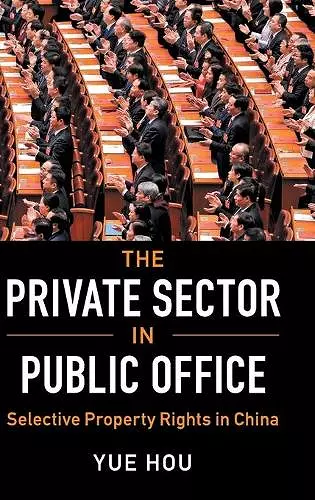The Private Sector in Public Office
Selective Property Rights in China
Format:Hardback
Publisher:Cambridge University Press
Published:5th Sep '19
Currently unavailable, and unfortunately no date known when it will be back
This hardback is available in another edition too:
- Paperback£31.00(9781108705530)

Examines how the private sector in China manages to grow without secure property rights.
This book addresses the long-standing puzzle of how China's private sector manages to grow without secure property rights. Drawing on rich empirical evidence, this book challenges existing theories of property rights and growth, and shows that a selective property rights regime can generate and sustain economic growth and political stability.This book addresses the long-standing puzzle of how China's private sector manages to grow without secure property rights, and proposes a new theory of selective property rights to explain this phenomenon. Drawing on rich empirical evidence including in-depth interviews, a unique national survey of private entrepreneurs, two original national audit experiments and secondary sources, Professor Yue Hou shows that private entrepreneurs in China actively seek opportunities within formal institutions to advance their business interests. By securing seats in the local legislatures, entrepreneurs use their political capital to deter local officials from demanding bribes, ad hoc taxes, and other types of informal payments. In doing so they create a system of selective, individualized, and predictable property rights. This system of selective property rights is key to understanding the private sector growth in the absence of the rule of law.
'In this fascinating and innovative book, Yue Hou breathes new life into the study of private entrepreneurs in China. She shows convincingly that China's entrepreneurs join local legislatures in order to protect their economic interests, not to promote political change.' Bruce Dickson, George Washington University
'How is entrepreneurship and economic growth possible under an authoritarian government that does not enforce property rights? Yue Hou shows how Chinese entrepreneurs enter local legislatures in order to ward off the constant threat of government expropriation, creating a system of individualized property rights protection. This important new book, with broad comparative implications, reveals that local political connections and fears of corruption and government theft are a fundamental feature of the contemporary Chinese economy.' Thomas Pepinsky, Cornell University
'To understand China's growth over the decades and China's future, we have to understand how private entrepreneurs have behaved despite a lack of formal protection of private property rights. Yue Hou's book offers a comprehensive theory and evidence of the important role of political connections in securing individualized property rights for connected entrepreneurs.' Lixin Colin Xu, Lead Economist, Development Research Group, The World Bank
'Yue Hou's The Private Sector in Public Office is a ground-breaking study that helps us understand the complex and fluid relationship between private wealth and political power. With robust empirical evidence, rigorous methodology, and insightful analysis, Hou has succeeded brilliantly in illuminating the puzzle of how private entrepreneurs can protect their wealth against state predation in an authoritarian regime. This book is a valuable contribution to the literature on political regimes and economic growth.' Minxin Pei, Claremont McKenna College and author of China's Crony Capitalism
'This fascinating book is a timely addition to the literature, given heated discussions in an era of 'Guo jin min tui' ('the state advances and the private sector retreats') during the Xi administration, especially when one witnesses an exodus from China, during the last few years, of successful businesspeople in their prime. A very valuable resource on political economy and economic development.' D. Li, Choice
ISBN: 9781108498159
Dimensions: 234mm x 156mm x 16mm
Weight: 420g
204 pages